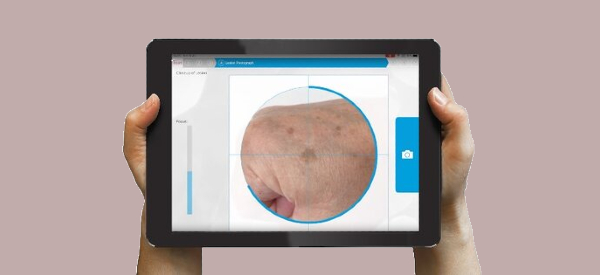
Physicians will diagnose more than 100,000 new melanomas among people in the U.S. this year, and about nearly 7,000 people will die from malignant skin cancer, according to the American Cancer Society. We’ve written several times about the role artificial intelligence can play in diagnosing moles, lumps, and spots on the skin. In 2017 we covered work by researchers at Stanford University who trained a deep neural net to classify skin lesions. Last year we wrote about a study published by the German Cancer Research Center based on their tests of deep learning against pathologists in detecting melanoma images.
Edinburgh-based Moletest (Scotland) Ltd. developed Nomela, a dedicated and secure iPad that primary care physicians can use to screen patients for melanomas before issuing referrals to dermatologists. The iPad takes high-quality images of suspicious skin lesions. Five AI algorithms analyzed the photos in real-time to present one of two results: “No evidence of melanoma” or “Melanoma is not excluded.” Moletest will publish results of clinical testing with Nomela conducted with NHS Lanarkshire later this fall. The company reports the tests indicated 53% of non-melanoma lesions evaluated rated as “No evidence of melanoma.” According to the Moletest, these results suggest that general practitioners using Nomela to assess skin lesions could reduce the number of unneeded referrals to dermatologists by more than 50%, saving up to £125 million per year in healthcare costs.
Particularly during the COVID-19 pandemic, any chance to avoid physician visits is an unqualified good thing. Moletest’s Nomela could be a lifesaver in other ways besides assisting with melanoma screening.

